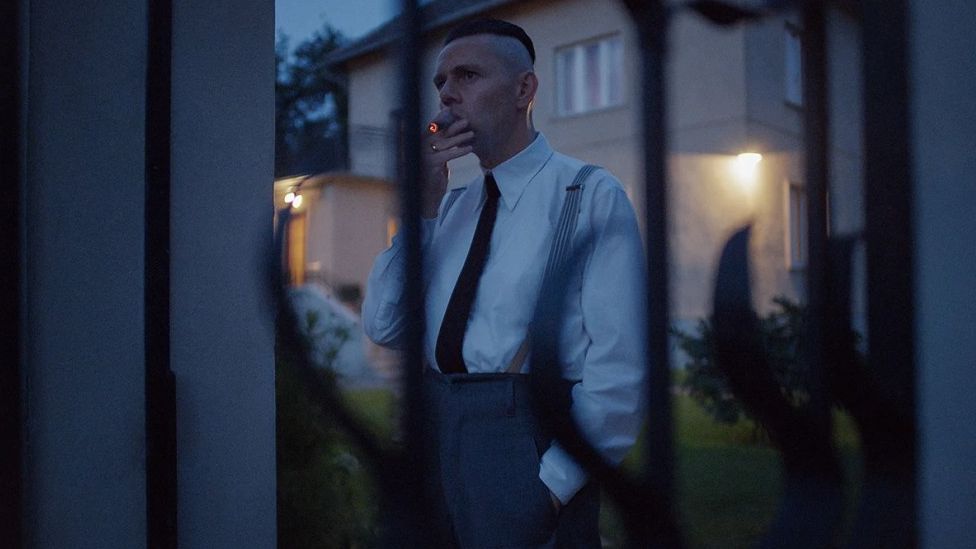Johnnie Burn: The uni drop-out who won an Oscar for his sound skills
- Published

Johnnie Burn was studying at City University and not enjoying it much, when life took the turn that eventually won him an Oscar on Sunday, for Best Sound in Zone of Interest.
"I was 19 years old and I was yawning, looking out of the window, doing a business degree," he told the BBC Radio 4's Today programme. "And I got lucky with a film producer whom I went to school with. He said, 'There's a job going as a runner, an apprentice'.
"So I joined as a 19-year-old apprentice and worked for a couple of years for a studio, delivering tea. And I was lucky to be working at the beginning of audio digital technology.
"So at six o'clock, when the clients went home, I got to play with £1m worth of equipment that was the uber version of everything I had in my bedroom - which was broken bits of kit."
His big break came when, one day, a sound engineer didn't turn up for work at the Soho studio.
"As I brought the tea in to the producer and actor, she asked me if there was anyone else who could record the actor, as they had to leave.
"I put the tea down and got to work," he said.
Thirty years later Burn is at the top of his industry, having also worked on Poor Things, which walked away with four Oscars this year.
But he is not the only former London student to have had a big night on Sunday.
Met Film School in Ealing had three recent alumni in the credits of The Wonderful Story of Henry Sugar, which won Best Short for Wes Anderson, his first Oscar.
'We can get quite excited'
So has Johnnie Burn blazed a trail for university drop-outs with the ability to listen hard?
Burn is doubtful. "There isn't a typical path," he said. "But [what happened to me] is [something] that doesn't tend to happen so much any more."
Is he right? Not everyone agrees.
"I think it is still possible to get into the industry the way Johnnie Burn did," said Sarah Winstanley, head of Met Film Futures, the school's careers service.
"Being a runner is a really good entry point.
"It gives you a sense of what the different roles are and it's a great way of making connections. Lots of film school graduates go on to be runners in film or TV or at a production office."
But she said a degree wasn't compulsory as apprenticeships were available with the BBC, ITV and Creative Access, all of which specialise in career support for hopefuls without industry contacts.
Charis Coke is the MA course leader at The London Film School and is also, like Burn, a sound designer.
She agreed a degree was not essential and added that choosing sound as a career could be a winning strategy.
"A lot of people want to do directing and editing," she said.
"But if you choose sound you can get a lot of experience quite quickly. I did a huge amount while I was still at Portsmouth Uni, got a job doing it as soon as I left and haven't looked back really.
"As a tribe, sound people tend to be a little less outgoing than cinematographers because we have to spend a lot of time on our own in a sound suite.
"It's not music - although I think Johnnie got into it via music - it's quite specialised and niche.
"But when we're with other sound people, who share our passion, we can get quite excited and surprisingly loud.
"Choose sound as a career and there are more media to work in. As well as film and TV, there's also animation, games, radio and podcasts.
"Sound is about creating an animal response from your audience. People respond to it in a visceral, unfiltered way. For instance, if you hear a loud noise nearby, you have a particular response that you're not necessarily in control of."
Ms Winstanley gave a shout-out to recent Met alumni who worked on Wes Anderson's Oscar-winning short, The Wonderful Story of Henry Sugar.
"We had Guy Trevellyan, who was a third assistant director, a role that's usually about extras and crowd control.
"Marta Baidek was the visual effects production manager and Ana Gabriela Fernandez Walean, who was second assistant, post-production.
"It's just lovely to see them all credited on a film that's won an Oscar. It's very rewarding," she said.
"If there is a benefit of film school, it's that you get taught how to use kit properly: cameras, lighting and other technical equipment.
Good at maths?
"But also - and this is crucial - it is your first industry network of people you can rely on when you're looking for collaborators."
She pointed to the sheer size of the UK film industry - £4.23bn was the combined spend for film and high-end TV production in 2023, according to the BFI - and the variety of roles that are available.
"Take something as simple as filming someone using a computer," said Ms Winstanley. "There is a production role for someone setting up the computer and a role for someone building the content that is on the screen.
"Films also need people to do stunts, drive vehicles and make clothes.
"But one of the biggest gaps at the moment is in production accounting: keeping track of the money.
"If you're at school and you're good at maths, that might not be something you'd automatically think of."
Listen to the best of BBC Radio London on Sounds and follow BBC London on Facebook, X and Instagram. Send your story ideas to hello.bbclondon@bbc.co.uk
Related Topics
- Published12 March
- Published11 March
- Published11 March